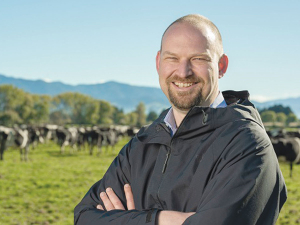Get ready for Moving Day
Moving Day is a big day in the farming calendar and requires good planning and communication to ensure success.
 DSM’s Mark van Nieuwland says the company is building a world scale production plant for Bovaer in the UK to help support global sales.
DSM’s Mark van Nieuwland says the company is building a world scale production plant for Bovaer in the UK to help support global sales.
Authorities in both the United Kingdom and Canada have now approved the use of methane-reducing feed additive Bovaer.
The product, made by global animal health company DSM, is now available and/or approved for use in 57 countries around the world - including New Zealand.
Bovaer is a feed additive which reduces methane emisions from cattle, with average reductions in dairy cows of 30%. This is the first authorisation in the UK for a feed additive targeted at an environmental benefit.
DSM claims this authorisation means that English, Welsh, Scottish and Canadian dairy farmers will now also have a scientifically proven solution to lower their carbon footprint significantly and reliably. The company adds that the feed ingredient will be an important tool for the nearly 10,000 dairy farmers in Canada and enable them to make a substantial step forward towards their net zero ambitions.
"For the entire dairy value chain, including supporting processors, retailers, and the food services sector, it means scope 3 emissions of dairy can be lowered with 10-15% CO2 equivalents per litre of milk," the company says.
It also claims this will help cattle farmers in approved countries in delivering on the commitments of the Global Methane Pledge and the Climate Change Act.
DSM's Mark van Nieuwland says the company is building a world scale production plant for Bovaer in the UK to help support global sales. Construction on the new plant is well under way in Dalry Scotland to become operational in the course of 2025".
Van Nieuwland adds that the aim is to make Bovaer available to the UK dairy sector early 2024 and it will work closely with the sector to introduce the product and its benefits to the dairy value chain.
One of the primary benefits of Bovaer is its capacity to significantly reduce methane emissions from the digestive systems of ruminant animals. Methane is a potent greenhouse gas, and its reduction can contribute to mitigating the environmental impact of livestock farming.
Preliminary studies suggest that Bovaer may positively impact animal health and performance. By promoting a more balanced digestive system, the additive could contribute to healthier and more productive livestock.
While Bovaer presents exciting possibilities, continued research is needed to fully understand its long-term effects, optimal dosage, and potential interactions with other aspects of animal nutrition.
NZ Still Waiting
NZ's Environment Protection Authority (EPA) gave the green light to register Bovaer in this country back in August 2023.
At that time, Bovaer global vice president Mark van Nieuwland told Rural News that the company was excited by the NZ EPA approval.
"This is an important first step on the NZ registration track and eventually will support farmers with their sustainability efforts to lower emissions from livestock," he said.
The previous government had come under criticism from NZ farming leaders for the delay in approving Bovaer.
The next stage in getting Bovaer approved for sale within NZ is getting Ministry for Primary Industries approval. MPI deputy director-general Vincent Arbuckle said New Zealand Food Safety has not received an application from DSM to use Bovaer in animals here under the Agricultural Compounds and Veterinary Medicines (ACVM) Act, and it was the company's choice when to make one.
"It's important to note that the product is mostly used in housed feeding situations overseas, which differ from New Zealand practices," Arbuckle explained.
About Bovaer
Bovaer is a feed additive for cows and other ruminants, such as sheep, goats, and deer.
Manufacturer DSM claims that 'just a quarter teaspoon per cow per day' consistently reduces enteric methane emissions by on average 30% for dairy cows and even higher percentages, on average 45%, for feedlot beef cattle.
Bankers have been making record profits in the last few years, but those aren’t the only records they’ve been breaking, says Federated Farmers vice president Richard McIntyre.
The 2023-24 season has been a roller coaster ride for Waikato dairy farmers, according to Federated Farmers dairy section chair, Mathew Zonderop.
Ministry for Primary Industries (MPI) director general Ray Smith says job cuts announced this morning will not impact the way the Ministry is organised or merge business units.
Scales Corporation is acquiring a number of orchard assets from Bostock Group.
Family and solidarity shone through at the 75 years of Ferdon sale in Otorohanga last month.
The Ministry for Primary Industries (MPI) has informed staff it will cut 391 jobs following a consultation period.

OPINION: This old mutt well remembers the wailing, whining and gnashing of teeth by former West Coast MP and Labour…
OPINION: Your canine crusader gets a little fed up with the some in media, union hacks, opposition politicians and hard-core…